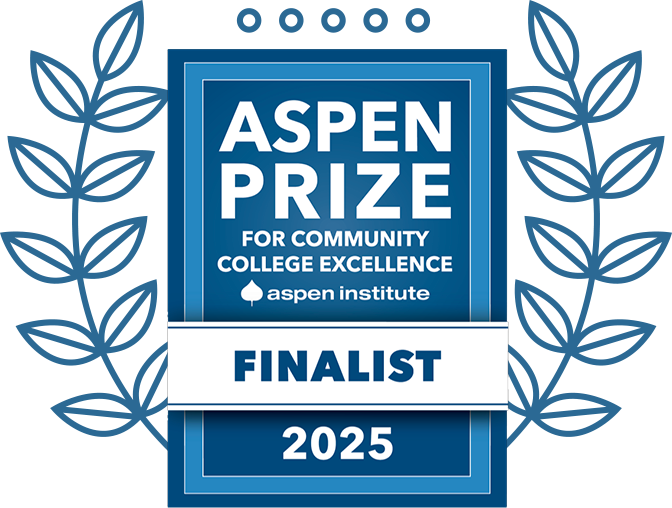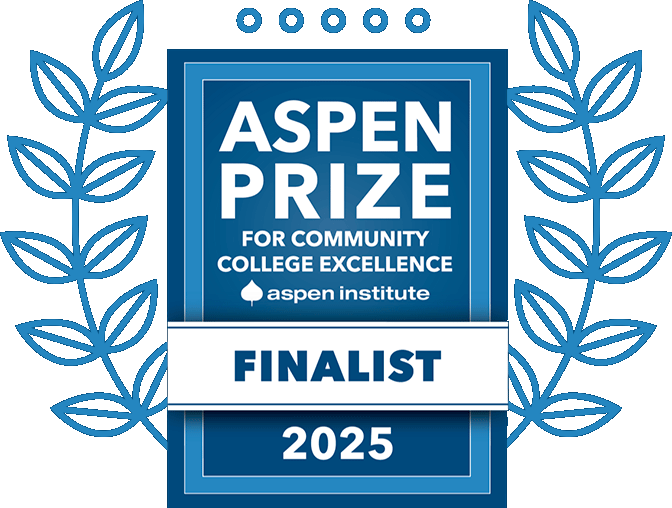Financial Aid Course Program of Study (CPoS)
Maximizing Your Financial Aid
Course Program of Study (CPoS)
A Minute to Learn It – 4 Steps to Selecting Your Classes
EFFECTIVE SUMMER 2023
The U.S. Department of Education (ED) regulations require that a student must be enrolled in a degree-seeking pathway/program of study to receive federal financial aid (Grants, Loans, Work-Study). Funds will only be disbursed for the courses needed to fulfill the program of study requirements. Effective Summer Semester 2023, students enrolling in courses that are not required to complete their officially declared pathway/program of study could see their financial aid prorated and/or cancelled as required by the Department of Education.
It is the College’s hope that Course Program of Study (CPoS) will help students remain on academic track toward graduation while keeping them fully eligible for federal financial aid.
What is CPoS?
Course Program of Study (CPoS) is the process that is run to identify courses within a student’s pathway/program of study. This technology will compare the courses a student registers for each term with the degree requirements listed on their DegreeWorks worksheet. Courses that do not apply towards a student’s officially declared pathway/program of study will be ineligible for federal financial aid.
Once a student is registered for classes the CPoS process will be run, and the student will be notified if they are registered for classes not covered by Financial Aid. Students will receive this email message sent to their GHC email address:
Please adjust your schedule immediately or seek assistance from your academic advisor. The Financial Aid Office cannot change your schedule or advise you of what courses will make you in compliance with the Department of Education CPoS rules. Only your Advisor can assist you with this.
It is the responsibility of the student to review these alerts and act upon them quickly, ensuring any adjustments are made before the deadline. Students can email advising@highlands.edu or schedule a one-on-one appointment with an advisor via Navigate .
CPoS FAQs
Example: I’m enrolled in 12 undergraduate hours but 4 of those hours do not count towards my officially declared program of study. How does this affect my financial aid? Federal financial aid will be disbursed based on the 8 credit hours that apply toward your officially declared program of study. The Federal Pell Grant award will be reduced from a full-time enrollment award to a halftime enrollment award. You may be eligible to receive federal loans because you are enrolled at least half-time status in eligible coursework. As applicable, your state and institutional aid well be based on full-time enrollment. However, your total aid may be reduced since it cannot exceed your Cost of Attendance (COA).
Contact your academic advisor by emailing advising@highlands.edu or schedule an appointment via Navigate . Do not begin modifying your schedule without consultation with an academic advisor!
An advisor will be able to review DegreeWorks to determine whether the system is accurately assessing your enrollment. If needed, you can work with your advisor to complete a course substitution request to see if the course(s) will count toward your program of study and Federal Financial Aid eligibility.
Course Program of Study (CPoS) works in conjunction with the student’s DegreeWorks. Therefore, it is important for advisors and students to refer to DegreeWorks. Requirements are based on the catalog year in effect when the student officially entered their pathway/program of study (when the pathway/program of study was officially declared at the time of admission to the College or a change of pathway/program of study was filed with the Registrar’s Office).
A course may be in the student’s pathway/program of study, but not count toward aid eligibility if it exceeds the number of repeat attempts allowed for federal aid. This is known as the Repeat Rule. If a student receives an ‘F’ grade in a course, they are permitted to retake the course as many times as they need until they make a ‘D’ or higher and have Federal Financial Aid cover the course. Once they have made a ‘D’ or higher, they are only permitted to retake the course one additional time after that and have Federal Financial Aid cover the course. This is regardless of what they make the next time or the grade required for progression in the pathway/program of study.
While a ‘D’ may not be successfully passing to advance a student’s academic program, the federal government’s REPEAT rule considers a ‘D’ as having a passing grade.
For this purpose, passing means any grade higher than an ‘F,’ regardless of any school or program policy requir¬ing a higher qualitative grade for the course to apply to the pathway/program of study. This retaken class may be counted towards a student’s enrollment status and the student may be awarded Federal Financial Aid for the enrollment status based on the inclusion of the class.
Possibly. Electives must satisfy a requirement of your declared pathway/program of study. Each degree program has variable numbers of electives. Some programs have very few, if any, electives, while others have a significant number of electives available. If you have been notified an elective is not counting toward your Federal Financial Aid eligibility, contact your advisor. If an advisor determines that the elective is satisfying a requirement and will count toward your declared pathway/program of study, they may submit a substitution request or contact the Registrar’s Office regarding a DegreeWorks exception.
Undergraduate double pathways must be officially declared and reflected in DegreeWorks by the census date to be included as eligible coursework for federal financial aid.
No. To receive a federal student loan, you must be enrolled at least half-time (6 credit hours) in credit hours that apply toward your officially declared program of study. Because only 4 credits apply to your program of study, you are not enrolled at least half-time to be eligible for federal student loans.
Much like pathway changes, subbed courses must have an approved substitution on file before the Federal Financial Aid census occurs, so DegreeWorks accurately reflects the approved subbed course. It is the student’s responsibility to ensure their pathway/program of study accurately reflects their current enrollment and any updates are submitted within sufficient time to allow for processing. See the Academic Calendar for the deadline to complete a change for each semester.


